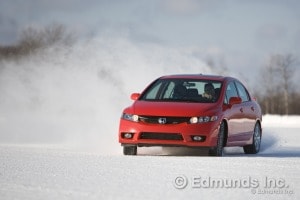Are you in the market for a new or used vehicle and having difficulty finding something in your budget? Or are you finding yourself making trade-offs to find something you can afford (i.e. less cargo space, lower trim level). A reporter from a national news publication would like to speak with you about your experience; please reach out to PR@Edmunds.com by this Friday, 11/21 for details.
Testing the Benefits of Winter Tires | Edmunds.com
 Edmunds.com
Member, Administrator, Moderator Posts: 10,316
Edmunds.com
Member, Administrator, Moderator Posts: 10,316
 Testing the Benefits of Winter Tires | Edmunds.com
Testing the Benefits of Winter Tires | Edmunds.com
All-season tires come on most every car sold in the United States, but how much can snow tires help those who live and drive in frigid winter weather?
0

Comments
For my recent sojourn in the UP of Michigan, I used an "all weather" tire - Nokian WR G2s. They were exceptional on my Outback in the snow and helped my winter unfriendly FWD minivan in summer rains. The WR G3s sound even better.
I also wish Edmunds would have tested a good all-season tire. The Pilot HX is almost phased out and is one of the worst overall all-season tires one can buy. It would have been nice to see a good all-season tire like the Continental DWS that handles snow incredibly well, but still performs well in the dry and wet.
Twitter: @Edmunds_Test
I'm not sure why they felt the need to test their summer tires in the snow... I think everyone already knows that is a bad idea.
Edmunds Price Checker
Edmunds Lease Calculator
Did you get a good deal? Be sure to come back and share!
Edmunds Moderator
Snow tires with studs or with out studs, Front wheel drive, Rear wheel drive. Are you a good drive or a less than good driver. to many variables for one answer.
The type of all-season tires you are comparing to is also important. Sports tires tend to be lousy in snow even if they are marketed as all-season, while passenger and touring all-season tires can be fairly decent.